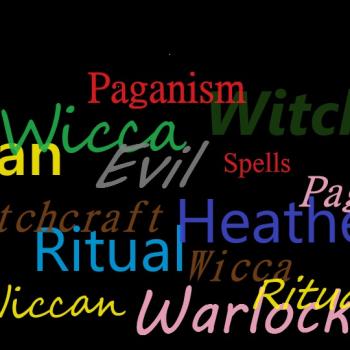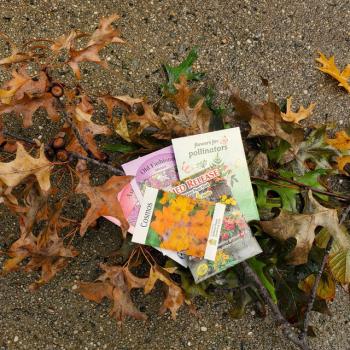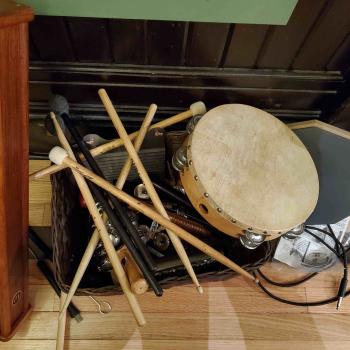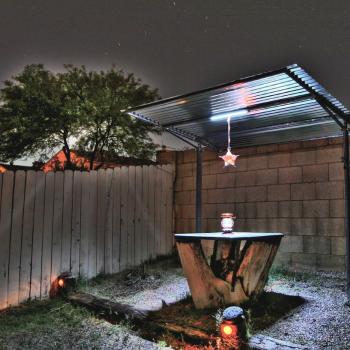 My teacher in Witchcraft, Christopher Penczak, when talking about (Pagan) ritual design taught me that there are three simultaneous levels that need to be considered. There are people who come to ritual to have a good time, to experience the joy of life and ritual, and a good ritual should meet this need. Then there are people who come to ritual for self-development of some kind, and a good ritual will give these folks some avenues for that. Finally, the ritual itself generates energy and that energy is used for something. Specifically in the context of Wheel of the Year rituals, the energy should be channeled to helping to turn the Wheel of the Year, and it is up to the ritualist to direct the energy in this way – though others in the circle may also be consciously amplifying that intention.
My teacher in Witchcraft, Christopher Penczak, when talking about (Pagan) ritual design taught me that there are three simultaneous levels that need to be considered. There are people who come to ritual to have a good time, to experience the joy of life and ritual, and a good ritual should meet this need. Then there are people who come to ritual for self-development of some kind, and a good ritual will give these folks some avenues for that. Finally, the ritual itself generates energy and that energy is used for something. Specifically in the context of Wheel of the Year rituals, the energy should be channeled to helping to turn the Wheel of the Year, and it is up to the ritualist to direct the energy in this way – though others in the circle may also be consciously amplifying that intention.
Self-Development
I’ve been thinking about this wisdom recently, both in the context of designing Pagan rituals, but also wondering if it might have some carry over into UU Sunday morning services. When I myself participate in a ritual I am not leading, I am most often doing so for the second of these three purposes of ritual – self-development. That’s just where I am most naturally drawn. So, unsurprisingly, that is the component of ritual design to which I pay most attention, and therefore, at which I am most skilled. I’m wondering if I’m missing something – and if those who experience rituals and services I design are missing something – because I’m less aware of and skilled in the other two areas.
Enjoyment of Ritual
Let’s think about the first one – the enjoyment of ritual part. There is lots of discussion in UU and Christian circles about worship as entertainment versus worship as something “deeper.” I acknowledge my own frustration with a certain consumerist mentality that can sometimes pervade the way people speak about worship. But, I think perhaps it can be too easy to dismiss the necessity for enjoyment in worship. In particular, I am thinking about the style of worship in communities that have experienced significant oppression, knowing that affirmation of life and joy are often important parts of these worship traditions. For example, please check out Kimberly Quinn Johnson’s reflection on the place of joy in black worship.
I think I have not been as attentive as I might be to the place of joy in worship – and the necessity for it as one of the vital reasons to do worship in the first place.
The Energy that Ritual Generates
The third strand in this model asks that we consider what we are doing with the energy that worship generates. When I lead a Pagan ritual, I am very attentive to this, in both planning and in the midst of leading ritual. But I almost never think about this when leading a UU worship service. In fact, these two modes have been so disconnected in myself that it was 2 years after completing my training as a Wiccan priestess that it ever occurred to me that one of the reasons I had a tendency to experience a pronounced crash in my energy level on Sunday afternoons is because I had not been grounding the energy raised during the service. All my training in witchcraft predicts exactly what happened to me every week – an energy high followed by a crash that meant I could basically not function for the rest of the day. I’m so glad it finally occurred to me to try grounding all that energy intentionally!
Wouldn’t it be even better, though, to actually use all that energy to some constructive end? We don’t raise a cone of power in a UU service the way we would in a Pagan ritual – we’re not generating the same kind of intentional energy, but a good worship service still generates energy. UU ministers talk about mediating that energy as part of the job of leading a service, but in my experience, I haven’t thought about (nor have I been encouraged by others to think about) consciously directing that energy to some purpose. I wonder what would happen if we did.
If so, where would we send that energy? I imagine each service might have a particular purpose to which the energy could be directed. Or it could be dedicated to a particular deity or spirit for aid in their work. Then the question would become whether to make this explicit or to simply silently direct the energy without speaking about it aloud. I can see good reasons for either choice.
I know this post is a lot more questions than answers. I’ll be experimenting on my own, but I would also love to hear your thoughts about this, if you have experience or ideas about how to do this more effectively!

















